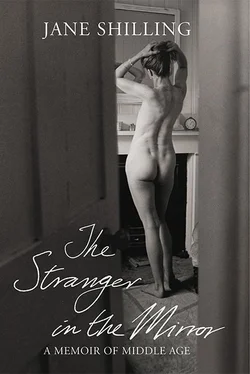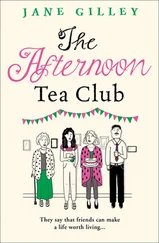‘You look as though you’ve done this before,’ accused a friend of the baby’s father, finding me changing a nappy with uncharacteristically cheerful competence when he popped round soon after the birth to scout the lie of the land. I hadn’t, but for once in my life I knew what to do by instinct, with no need of a book to tell me. It was only much later in my career as a mother, when the primitive, wordless relationship of early childhood was replaced by something more reasoned and sophisticated, that the malady of intelligent cats overtook me.
‘Each period in the life of woman is uniform and monotonous,’ wrote Simone de Beauvoir in The Second Sex , ‘but the transitions from one stage to another are dangerously abrupt; they are manifested in crises – puberty, sexual initiation, the menopause – which are much more decisive than in the male.’
De Beauvoir takes an exceptionally bleak view of the experience of menopause. Her lengthy depiction of the prolonged menopausal ‘moral drama’ of the underemployed bourgeois housewife: the erotomania, incestuous urges, pathological creativity (interminable crochet, amateur watercolours, book groups and other horrors) and oppressive meddling in assorted good works (charities, school boards and local councils tremble, says de Beauvoir, at the approach of the energetic middle-aged female), reads quaintly to a twenty-first-century woman trying to schedule time for mourning the end of her fertility between a full-time career, running a house and bringing up children, whose own moral drama of adolescence may well be clashing inconveniently with hers of menopause.
An underlying monotony in the pattern of one’s existence is harder to perceive when life appears to unfold in a state of continuous crisis – as it does when one is preoccupied with paid work, or children, or a combination of the two. Intense busyness can mimic a sense of forward momentum with eerie accuracy. Minutes pass, hours, days, weeks, months and years, in a flurry of spent energy. Jostled and buffeted by deadlines, salary reviews, sales conferences, SATs, GCSEs, Christmas, the school holidays, the sales, the start of the new school year (and Christmas again, already!), one labours doggedly to achieve the official landmarks of a fulfilled existence as a woman – a love, a home, a job, a child.
At the beginning of the great expanse of one’s years of sexual maturity, the broad, flat, three-decade plateau of fertile womanhood, one feels, like Jinny in Virginia Woolf’s The Waves , that ‘Days and days are to come… we have scarcely broken into our hoard.’ Time passes, the seasons turn, the river flows idly; distracted by duty and business we fail to remark a quickening of the current until in an instant something startles us: a change of circumstance, a divorce, an illness, an accident or unexpected loss. Then we look up and see that the landscape has altered. While we were busy, the tide has swept us downstream. Places where we hoped to step ashore and linger, to pursue a friendship or a love affair, follow an ambition, raise a child, now lie behind us, just out of reach.
Ahead the current hurries towards rapids and beyond them a chasm clouded in spray, by which the lie of the land in the distance is obscured. The hoard of time is half spent – and on what? The minutes and hours, days and weeks not run together into the ‘whole and indivisible mass that you call life’ ( The Waves again), but frittered away in boredom and triviality, in housework, office work, idle chat, bad love affairs, silly quarrels, phone calls, shopping trips, school runs, PTA meetings, and hours and hours of terrible television.
As half a life’s work, as a bulwark against the crisis of menopause and a foundation for the rest of our lives – a time as long again, perhaps, as the time that we have already lived – the fruit of the fertile years can seem dangerously insubstantial. At 50, I feel that I am still working out what I want to be when I grow up. I am not ready to be told that it is too late, that I’ve had my turn and must get off the ride now and let someone else have a go.
Here, more than ever, is where the consolations of narrative are needed. To turn something into a story is to give it shape, solidity, dignity, a presence in the world. To gather up some scraps of nothing and mould them into an artefact is to lend them a value. Like old-fashioned patent remedies, storytelling is both soothing and stimulating, sovereign against all known maladies, from dread of the unknown to the state of sick disgust with the tedium of everyday life variously known as accidie, ennui, cafard or (particularly when presented to busy doctors by middle-aged female patients) depression.
Gripped for the third time in my life by the whirling sense of being swept into a liminal state from which I would emerge once again fundamentally changed – myself, but not myself – I felt once again the need for a fictional prototype to give me a lead; someone to make the process seem coherent, shapely, resonant, rather than confused and disorderly.
The trouble is that – according to Germaine Greer – there are no middle-aged fictional heroines. Greer argues that, ‘In fiction, whether written by men or by women, middle-aged women are virtually invisible. All our heroines are young.’ As evidence of the dismissive treatment of middle-aged women by novelists she produces Jane Austen’s dithering Miss Bates, the object of the heroine’s brutal scorn in Emma , and Mrs Gaskell’s tremulous Miss Matty, whom even her Cranford neighbours think older than her real age of 52. Both are, in fact, women whose pusillanimous manner hides a character of real courage in the face of age, loneliness and financial disaster. All the same, Greer has a point: as models for the task of opposing the indignities heaped on middle-aged women by twenty-first-century society, they’re not really up to the job. I felt in need of someone fiercer, more sceptical and mocking, more self-assured, as a household goddess for my middle age.
Shimmering on the margins of my mind were the images of several middle-aged women, figures from texts that I had read long ago when my preoccupations were different. One was the Virgin Mary’s barren middle-aged cousin, Elisabeth, who conceives a son when ‘well stricken in years’ and speaks in a transport of joy at feeling her child leap in her womb the beautiful biblical verses that are the preamble to the Magnificat.
Her appearance in St Luke’s Gospel is fleeting, but in the space of a few sentences she establishes herself as something more than a mere submissive receptacle of God’s will: a woman vividly engaged with life and resilient enough to accept whatever surprises come her way. (I also liked this story for its thunderous reproof of the prudish hand-wringing with which modern stories of middle-aged motherhood are often reported. No one in St Luke’s account thinks for a moment that Elisabeth’s son – who grows up to be the prophet, St John the Baptist – is anything other than a miraculous blessing.)
If you cast back far enough in literature, the squirming coy distaste that currently infests the subject of middle-aged sexuality vanishes in a blaze of bawdy pragmatism. Chaucer’s Wife of Bath is an early, magnificent specimen of a type of middle-aged woman (Paulina, the fearless champion of Leontes’s wronged wife Hermione in Shakespeare’s Winter’s Tale , is a later example) who occupies something rather like the privileged position of a court fool: a person standing at an angle to society, licensed by virtue of a certain institutionalised powerlessness to observe and utter uncomfortable truths about the state of the world around them. A shrew, is one word for the type, but the Wife and her successors are not shrews merely. Their experience of life, the extent of their self-knowledge, is too richly complicated to be contained by the insult.
Читать дальше












